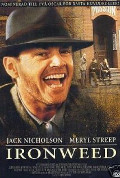
Directed by
Hector Babenco
135 minutes
Rated MA
Reviewed by
Bernard Hemingway

Ironweed
Hector Babenco follow-up to his enormously successful but considerably over-rated, Kiss of the Spider Woman broaches interesting material but does not bring it to a satisfying level of coherence. Although I have not read William Kennedy's Pulitzer Prize-winning novel on which it is based, clearly a significant problem is that the film has schematized the source material and despite the fact that the script is by Kennedy himself it remains an patchwork of narrative elements without emotional force.
Set over the course of a few days in Albany, New York in post-Depression 1938, the film follows the activities of Francis Phelan, a vagrant who for 22 years has lived an itinerant’s life after leaving his home because he was responsible for the accidental death of his infant son. The film is essentially the story of his attempts to reconcile himself with the past.
There are a couple of immediate problems with the film. One is the relentless misery with too much of the film is given over depicting the monotonously bleak reality of a vagrant’s life – drunkenness, homelessness and ultimately death in a bitterly cold New York autumn or at the hands of thugs, being the order of the day. In its latter stages when Francis goes back to his family home to see his wife, Annie (Carroll Baker) and grown-up children there is a brief change of dramatic tonality to a kind of Death of A Salesman-like drama but the film soon (and without any explanation) reverts to the overwhelming sense of chronic wastefulness. There are livelier flashback sequences (in which an inappropriately-cast Frank Whaley plays the Nicholson character) but these seem contrived compared to the main story.
The historical recreation is impressive (the film cost $27m to make) but Babenco plays out the story like a slide show, keeping his camera at 90 degrees to the action, panning from scene to scene and failing to generate any dynamism, something which is exemplified in the opening shot of a sleeping Francis at the foot of a brick wall. Thus, although Jack Nicholson gives a fine performance we are aware of each of his scenes as a separate “take” rather than being drawn into his character and story. Meryl Streep is, as always, uncanny in her ability to transform herself, here playing Francis's companion, a homeless woman of questionable cleanliness and sanity but her role never extends beyond that characterization. Indeed it is as empathetic portrayal of the lives of homeless people (Tom Waits does a good job as Francis’s buddy Rudy) that the film works best, bringing home the awareness that, albeit maybe long ago, every bum once had a brighter future.
Want something different?





